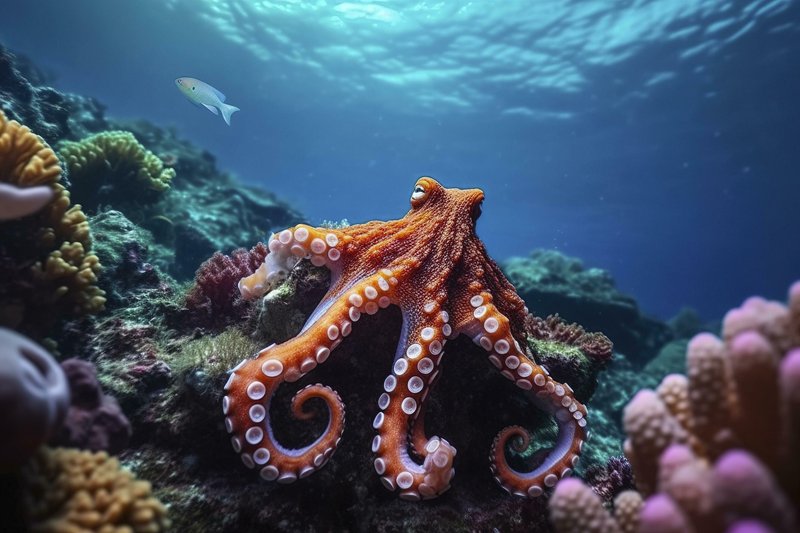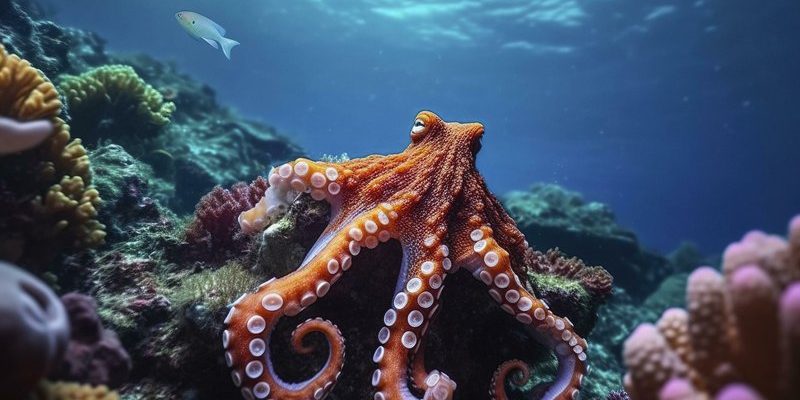
Octopuses are more than just intriguing due to their eight arms and remarkable intelligence. They are essential participants in the delicate balance of marine life. Imagine a web of connections in the ocean, where each creature has its part to play. The octopus fits into that web, influencing everything from prey populations to the health of coral reefs. Let’s dive into their role and discover why they matter so much to our oceans.
The Octopus as a Predator
Octopuses are skilled hunters, using their flexibility and problem-solving abilities to catch prey like crabs, clams, and small fish. Their hunting style is quite unique. They can camouflage themselves with their surroundings, making them nearly invisible to unsuspecting prey. Once the moment is right, they pounce with lightning speed, using their powerful beaks to crack open shells and enjoy a delicious meal.
This predatory behavior is crucial for maintaining the balance in marine ecosystems. By controlling the populations of various prey species, octopuses help ensure that no single species dominates the ecosystem. For example, if octopuses weren’t around, crab populations could explode, leading to overgrazing of seagrass beds and disrupting entire habitats.
Octopuses and Their Prey: A Balanced Relationship
You might be wondering how the relationship between octopuses and their prey contributes to ecosystem health. It’s all about balance. When octopuses eat their favorite meals, they inadvertently help create a diverse marine environment.
For instance, when crabs and small fish are kept in check, it allows seagrasses and corals to thrive. These plants are essential for providing shelter for many marine species and maintaining water quality. So, the octopus isn’t just a predator; it’s a key player in promoting a vibrant underwater community.
Another fascinating aspect of this relationship is the evolution of prey species. Prey animals often develop strategies to evade octopuses, leading to an evolutionary arms race. This not only enhances the survival of various species but also contributes to the overall health and diversity of marine ecosystems.
Camouflage and Adaptation: Octopus Survival Skills
One of the octopus’s most impressive skills is its ability to change color and texture to blend into its surroundings. This talent goes beyond mere camouflage; it’s a sophisticated form of communication and defense.
When threatened by a predator or competing for mates, octopuses can quickly alter their appearance. This ability not only helps them escape danger but also plays a role in keeping the ecosystem balanced. By staying hidden, they can control their predatory behaviors without overly depleting prey populations.
Moreover, their adaptation skills showcase the concept of resilience in nature. As environmental conditions change, such as shifting water temperatures or habitat destruction, octopuses can adjust their behaviors and strategies. This adaptability is vital for the survival of the species and, by extension, for the ecosystems they inhabit.
Impact on Coral Reefs and Biodiversity
Coral reefs are often called the “rainforests of the sea,” and octopuses play a crucial role in their health. These vibrant ecosystems are teeming with life, but they’re also fragile and susceptible to various threats, including climate change and pollution.
Octopuses contribute to coral reef ecosystems in several ways. For one, they can help control herbivore populations that graze on coral, preventing overgrazing. When octopuses hunt herbivores, like parrotfish, they promote coral growth and health. Healthy coral reefs, in turn, provide habitat and shelter for countless marine species, enhancing biodiversity.
Additionally, octopuses themselves contribute to the reef ecosystem by creating burrows and shelters among rocks and corals. These structures provide refuge for other creatures, fostering a sense of community within the reef.
The Role of Octopuses in Marine Food Chains
Every marine ecosystem has a delicate food chain, and octopuses fit neatly into this web. They are considered both predators and prey. As predators, they help manage the populations of their prey species, as we’ve discussed. But they also serve as a food source for larger creatures, like sharks and sea turtles.
This dual role is essential for maintaining the flow of energy through marine ecosystems. When octopuses thrive, they support a healthy population of their predators, ensuring that the entire food chain remains balanced.
It’s like a game of musical chairs; if one player is removed from the game, it can disrupt the entire flow. If octopuses were to decline, it could lead to an increase in their prey species, which would then affect the predators that rely on them. This interconnectedness underscores the importance of protecting octopus populations.
Conservation Challenges Facing Octopuses
Unfortunately, octopuses face numerous challenges in today’s world. Overfishing, habitat destruction, and climate change significantly impact their populations. As humans continue to exploit marine resources, we disrupt the natural balance that octopuses help to maintain.
Overfishing not only reduces octopus numbers but also affects the larger marine ecosystem. When octopuses are overharvested, their predators may struggle to find food, leading to further imbalances.
Additionally, climate change poses threats through rising ocean temperatures and acidification, which can harm the delicate coral reefs that octopuses depend on. Healthy ecosystems are vital for octopus populations to thrive, and we must recognize the ongoing challenges they face.
Why Protecting Octopuses Matters
So, why should we care about octopuses and their role in marine ecosystems? The answer lies in their significance to biodiversity and the overall health of the ocean. Healthy oceans are essential for our planet’s well-being, affecting everything from global weather patterns to food security.
By protecting octopuses and their habitats, we support the entire marine ecosystem. This, in turn, ensures that various marine species, including those that humans rely on for food and livelihoods, can continue to thrive. It’s about preserving the beautiful complexity of life beneath the waves.
Moreover, octopuses have cultural significance as well. They spark curiosity and wonder in people around the world, serving as symbols of marine life’s beauty and mystery. By recognizing their value, we promote a culture of conservation and respect for our oceans.
As you can see, the octopus isn’t just a fascinating marine creature; it’s a crucial part of the ocean’s ecosystem, influencing everything from prey dynamics to coral reef health. Understanding their role helps us appreciate the intricate web of life that sustains our planet.
In short, the octopus holds an important key to preserving marine ecosystems, and it’s our responsibility to ensure they remain a vibrant part of our oceans for generations to come.

